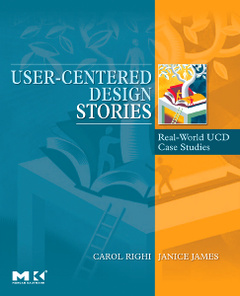Description
User-Centered Design Stories
Real-World UCD Case Studies
Interactive Technologies Series
Authors: Righi Carol, James Janice
Language: English
Subject for User-Centered Design Stories:
560 p. · 19x23.3 cm · Paperback
Description
/li>Contents
/li>Readership
/li>Biography
/li>Comment
/li>
User-Centered Design Stories is the first user-centered design casebook with cases covering the key tasks and issues facing UCD practitioners today. Intended for both students and practitioners, this book follows the Harvard Case study method, where the reader is placed in the role of the decision-maker in a real-life professional situation.
In this book, the reader is asked to analyze dozens of UCD work situations and propose solutions for the problem set. The problems posed in the cases cover a wide variety of key tasks and issues faced by practitioners, including those related to organizational/managerial topics, UCD methods and processes, and technical/ project issues.
The benefit of the casebook and its organization is that it offers new practitioners (as well as experienced practitioners working in new settings) valuable practice in decision-making that cannot be obtained by simply reading a book or attending a seminar.
Janice James is Director of User Experience at Perficient and has more than 18 years of experience in the field of human factors, usability and user-centered design and development for software, hardware, travel, Internet, financial services, education, health care and retail products and services. During the last eight years as principal of her own consulting firm, Simply Usable through Design, she has focused on providing usability engineering and interface design consulting services to companies ranging in size from start-ups to Fortune 500s, including CNet, AOL/Netscape, Hewlett Packard, Unisys, Intuit, Humana, BestBuy.com, eBay, AARP and McGraw-Hill, to name a few. Janice has a broad range of experience in all types of usability and user-centered design processes. She also founded the Kentuckiana Chapter of STC and co-founded the Society for Technical Communications’ Professional Interest Committee on Usability.
- The first User-Centered Design Casebook, with cases covering the key tasks and issues facing UCD practitioners today.
- Each chapter based on real world cases with complex problems, giving readers as close to a real-world experience as possible.
- Offers "the things you don't learn in school," such as innovative and hybrid solutions that were actually used on the problems discussed.

